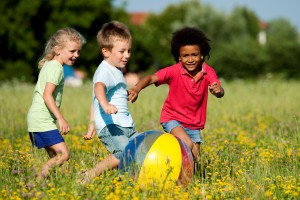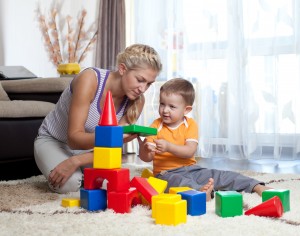 We are lucky to live in this beautiful land blessed with freedoms, organized human rights, and a constitution that protects those rights (or did). But even still, each coming generation is more and more threatened by violence, poverty, exploitation and child labor, and in many cases a blatant lack of parenting.
We are lucky to live in this beautiful land blessed with freedoms, organized human rights, and a constitution that protects those rights (or did). But even still, each coming generation is more and more threatened by violence, poverty, exploitation and child labor, and in many cases a blatant lack of parenting.
Each one of those threats takes something from us. Steals our right to be or do something. One of those rights (I’m speaking of specifically) beginning to be more scarcely practiced, is that of play in our children.
Child’s Play – A Right
Children’s play. Futile, you might think in the grand scheme of things (especially when talking in terms of human rights) but it’s more important than you might think. So important in fact that it has been sanctioned by the United Nations High Commission as a right of every child.
In this day in age our rights are constantly challenged and degraded not only by terrorists or those who seek to cause physical harm but by ourselves. By our schools. By our Educators. By those who we have deemed worthy to lead us.
Though these threats aren’t necessarily malicious in nature, most are in response to the poorly assessed view of ‘falling behind’ other countries in our overall education. Because of this, our public school systems have opted to accelerate academics, which in turn has removed play from the elementary classroom almost entirely.
 Falling Behind in Play
Falling Behind in Play
This insufficient idea that our population’s education has fallen short due to the amount of play we allow is outrageous. Proof of this is in the competition itself while some of the more learned or excelled countries, in terms of literature, math, and science, support and thrive on early childhood play. For example, a regular world leader in all three of these subjects, Finland, doesn’t begin formal schooling until the age of 7, where even then a day of school is half that of a regular school day.
Sadly, this is just one of the factors responsible for this negative impact on our children’s play. Unfortunately, even in non-poverty stricken, very adequate lifestyles our children have been found to be limited from enjoying these rights of play and important development.
We are responsible for the lack of playtime our children receive. With our current way of life, we have adopted more hurried patterns that end up putting more pressure on our children to go and do and be what, when, wherever, and however we demand. What we don’t understand is that when we deprive them of the developmental benefits of play, we are in actuality, limiting their abilities and advantages to a better educated body and mind.
 Proof in Play – Childhood Development
Proof in Play – Childhood Development
Children who are given opportunity of regular unstructured playtime have been shown to excel academically and socially. Play is actually what “prepares a young brain for life, love and even schoolwork” (Sergio Pellis, University of Lethbridge). These interactions of unstructured play develop the pre-frontal cortex. They learn negotiation skills, problem solving skills, how to regulate emotions and other social skills when given regular playtime.
Play allows children to become the master of their skills. It allows them to experiment, to explore and to develop fine motor skills. Play very well may be solely responsible for determining whether or not we have active and healthy children.
Nowadays, spending less than 30 minutes a day in unstructured outdoor play overall, our children have become more obese, more anti-social, lost the ability to focus for a time on a single topic, and behave more poorly than ever before. And that being said, the U.S. is the hands down leader in prescribing ADHD medications to children.
 Connecting with our Children
Connecting with our Children
Being able to communicate with our children, gaining trust and respect are extremely important roles we play as parents. But how can we expect them to be able to communicate and create these relationships if they aren’t giving them the time they need to adequately develop the skills they require to do so?
Think back to when we were the kids. The days of playing outside with our siblings or friends till mom calls us in for lunch are no longer. We struggle communicating with our children because we can’t identify with what they are going through. We don’t understand that they aren’t properly able to develop conflict resolution, role playing, and language skills due to lack of imaginative play opportunities.
Children naturally work hard at creating fantasies to cope with troublesome situations. While working, or playing hard, they are stimulating and influencing the connections made in their brains. These connections naturally build upon their ability to outwardly express what they are learning and what they are teaching themselves through their play.
For example, creative expression and movement through music have been known to help build outlets for children to express themselves appropriately in all sorts of situations. Music gives children the opportunity to connect to the world they live in through developing their own feelings and observations. It allows them to recognize differences in timing and rhythm and helps them develop their own patterns of sound or movement.
 Play is the new Work
Play is the new Work
Our busy and demanding lifestyles have resulted in merging professional work and home life and the lines separating the two have become more and more blurred. In recognizing that the opportunities coupled with our more “immediate and entitled” lifestyles may give us more freedom, we also need to realize there are other freedoms we may be sacrificing in the process.
Creative growth is a lot of work. We could learn much from our children, and about them, if we only sat back and watched them play. We might even come to the conclusion that if we played more ourselves, our own work might come to us with greater ease.
We may not be able to do a whole lot about our public schools systems, or the growing dangers of allowing our children to play freely in the outdoors. But we can absolutely re-define our own boundaries to help make sure our children are getting the time they need to play and develop.
What are your thoughts on play?